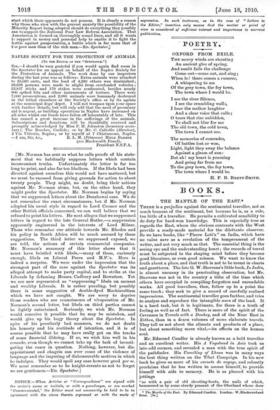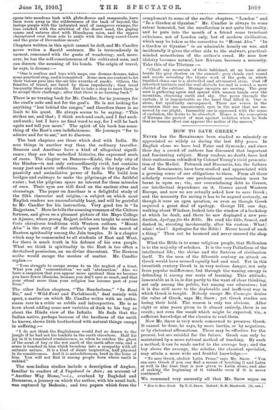BOOKS.
THE MANTLE OF THE EAST.*
THERE is a prejudice against the sentimental traveller, not so much because of the sentiment, but because he is, as a rule, too little of a traveller. He permits a cultivated sensibility to do duty for hard-won knowledge. This is especially true as regards the East, where the obvious contrasts with the West provide a ready-made material for the dilettante observer. So we have books, like "Pierre Loti's " on India, which have no value save as a revelation of the temperament of the writer, and not very much as that. The essential thing is the seeing eye and the understanding heart; the records of travel must be subjected to the shaping mind before they become good literature, or even good science. We want to know the truth about a place, and that truth is not to be tound in charts and gazetteers. The late G. W. Steevens's little book, In India, is almost uncanny in its penetrating observation, but Mr. Steevens was not in the country a tithe of the time which others have occupied in compiling forgotten and unreadable works. All good travellers, then, follow up to a point the same track ; they seek to give a record of carefully realised impressions. The sentimental traveller goes further, and tries to analyse and reproduce the intangible aura of the land. It is a hard task, but it is legitimate, for there is a truth of feeling as well as of fact. There is more of the spirit of the Cevennes in Travels with a Donkey, and of the Near East in Rithen, than in a dozen volumes of more elaborate travels. They tell us not about the climate and products of a place, but about something more vital,—its effects on the human soul.
Mr. Edmund Candler is already known as a bold traveller and an excellent writer. His A Vagabond in Asia took us into odd corners, and revealed a man with the true spirit of the pathfinder. His Unveiling of Lhasa was in many ways the beat thing written on the Tibet Campaign. In his new book he gives us more of his carnets de voyage, and robustly proclaims that he has written to amuse himself, to provide himself with aids to memory. He is as pleased with his jottings
"as with a pair of old shooting-boots, the nails of which, hammered in by some sturdy peasant of the Oberland whose door
• The Mantle of the Fait. By Edmund Candler. London; W. Blaokwoodand Sons. [6e.]
opens into meadows lush with globe-flower and campanula, have been worn away in the wildernesses of the back of beyond, the insteps purple with the indurated mud of mangrove swamps, the toes cracked with the attrition of the desert sand, the gaping seams and sutures shot with Himalayan mica, and the uppers charactered over from sole to ankle with the sharp camel-thorn and the gorse of Devonshire moors."
Chapters written in this spirit cannot be dull, and Mr. Candler never writes a flaccid sentence. He is tremendously in earnest, consumed with the gusto of wandering; and, more- over, he has the self-consciousness of the cultivated man, and can discern the meaning of his bonds. The origin of travel, he says, is dreams :—
" One is restless and toys with maps, one dreams dreams, takes seine practical step, and is committed. Some men are content to let their visions pass into the air like wreaths of smoke. Others, the fanatics of travel, are lured by them impulsively; they tread buoyantly these airy citadels. But to take a step to meet them is to accept their challenge; after that there is no turning back."
There is no turning back for Mr. Candler, for he journeys for the road's sake and not for the goal's. He is not looking for anything "lost behind the ranges," and therefore there is no limit to his quest. He always seems to be saying: "This strikes me, and that ; I think such-and-such, and I feel such- and-such ; but I have no final word to say, for I will be back again and tell you more." The spirit of his book has some- thing of the East's own indefiniteness. He journeys " for to admire and for to see," not to discover.
The best chapters are those which deal with India. He sees things in another way than the ordinary traveller. Benares and Amritsar have a kind of allegorical signifi- cance; they are the embodied histories, the expressed souls of races. The chapter on Benares—Kfishi, the holy city of the Hindus—is not only extraordinarily vivid, but contains many just and acute reflections. The city is the type of the passivity and assimilative power of India. We build iron bridges and railways to make the pilgrimage of the faithful easier ; but the pilgrims spare no interest for these miracles of ours. Their eyes are still fixed on the ancient rites and cleansings. The paper on Amritsar is a delightful study of the Sikh character and origins,—a subject on which most English readers are uncomfortably hazy, and will be grateful to Mr. Candler for his instruction. Very good too is " In Rajputana." Here he tells the amazing romance of the Chitore fortress, and gives us a pleasant picture of the Mayo College at Ajmere, where young Rajput nobles are taught to combine their chivalrous traditions with Western culture. "Mount Abu " is the story of the author's quest for the secret of Eastern spirituality among the Jain temples. It is a chapter which may be commended to all students of East and West, for there is much truth in his defence of his own people. What we think is spirituality in the East is too often a
devitalised pessimism, an un-divine discontent. The Eastern scribe would escape the meshes of matter. Mr. Candler replies :—
" Your struggle to escape seems to us the neglect of a trust. What you call concentration' we call 'abstraction.' Also we have a suspicion that you appear more spiritual than we because you have fewer illusions, because you don't care so much, and that your ritual more than your religion has become part of your lives."
The other Indian chapters, "The Sundarbans," "In Roni Bir," and " Wild-Fowl and Parlakimedi," deal mainly with sport, a matter on which Mr. Candler writes with an enthu- siasm rare in a critic so subtle and introspective. He is as keen about adding some new varieties of duck to his bag as about the Hindu view of the Infinite. He finds that the Indian native, perhaps because of the hardness of the earth he knows, shows little brotherhood with natural things except in suffering :—
"I do not think the Englishman would feel so drawn to the jungle if he had not his tendrils in the earth elsewhere Half his joy in it is translated reminiscence, as when he catches the ghost of the scent of hay or the wet smell of the earth after rain, and a sense is touched in him which broadens into a sympathy with all animate nature. It is a kind of dumb inspiration, half physical in its sensitiveness. And it is autochthonous, bred in the bone of him. You will not find it among people born where earth is unkind."
The non-Indian studies include a description of Angkor, familiar to readers of A Vagabond in Asia ; an account of
"Another Way Home,"—i.e., overland by Baghdad and Damascus, a journey on which the author, with his usual luck, was captured by Bedouin; and two papers which form the
complement to some of the earlier chapters, " London " and "In a Garden at Gyantse." Mr. Candler is always to some extent homesick, but the recollection is not quite the reality, and he puts into the mouth of a friend some trenchant criticisms, not of London only, but of modern civilisation, which may be taken as the corrective to "Mount Abu." "In a Garden at Gyantse" is an admirable homily on war, and incidentally it gives the other side to the stalwart, practical- minded monotheism of the author's creed. He sees how idolatry becomes natural, how Nirvana becomes a necessity. Take this of the Tibetans :-
"Climb any mountain of their tableland, sit an hour alone beside the grey chorten on the summit: grey clouds curl round and recede revealing the titanic work of the gods, in which tumbled chaos one is a shrivelled and attenuated atom. Cast off inherited instincts and the soul shrivels too and is cowed, a mere chattel of the sublime. Strange energies are moving. The grey mist is gathering again and spread with unseen hands over the mountain, obscuring earth and sky. One peers through the curtain ; it is impenetrable as the hand that lifted it. Ono is alone, but spiritually encompassed. There are voices in the mountain that are unconcerned, eyes in the mist that aro un- moved by our plight. Insensibly one is oppressed with the sense of exclusion, the desire to be absorbed. Hence is the conception of Nirvana the protest of man against isolation when ho feels that no human effort can appease the malice of the unseen."











































 Previous page
Previous page